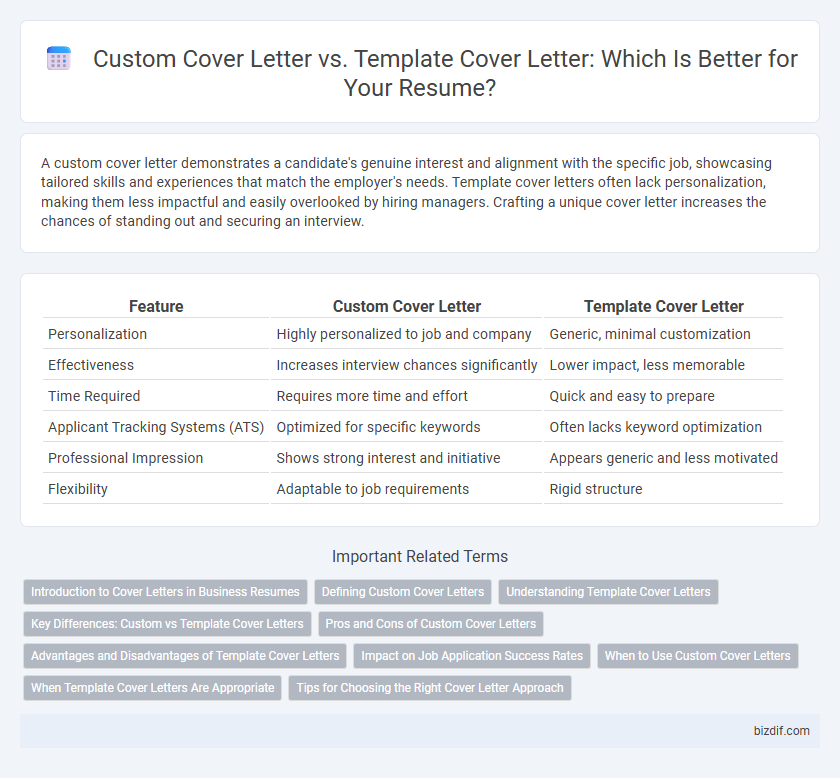A custom cover letter demonstrates a candidate's genuine interest and alignment with the specific job, showcasing tailored skills and experiences that match the employer's needs. Template cover letters often lack personalization, making them less impactful and easily overlooked by hiring managers. Crafting a unique cover letter increases the chances of standing out and securing an interview.
Table of Comparison
| Feature | Custom Cover Letter | Template Cover Letter |
|---|---|---|
| Personalization | Highly personalized to job and company | Generic, minimal customization |
| Effectiveness | Increases interview chances significantly | Lower impact, less memorable |
| Time Required | Requires more time and effort | Quick and easy to prepare |
| Applicant Tracking Systems (ATS) | Optimized for specific keywords | Often lacks keyword optimization |
| Professional Impression | Shows strong interest and initiative | Appears generic and less motivated |
| Flexibility | Adaptable to job requirements | Rigid structure |
Introduction to Cover Letters in Business Resumes
Custom cover letters in business resumes allow for personalized introduction tailored to the specific job role and company culture, increasing the likelihood of catching the recruiter's attention. Template cover letters offer a standardized approach but may lack the unique elements that highlight individual skills and experiences relevant to the position. Effective introduction in a cover letter should clearly communicate the candidate's value proposition while directly addressing the employer's needs and expectations.
Defining Custom Cover Letters
Custom cover letters are personalized documents tailored to a specific job application, incorporating relevant skills, experiences, and company insights to create a targeted narrative. They demonstrate genuine interest and alignment with the employer's needs, increasing the chances of standing out in applicant tracking systems (ATS). Unlike template cover letters, custom versions significantly improve engagement by addressing unique job requirements and reflecting the applicant's understanding of the company culture.
Understanding Template Cover Letters
Template cover letters provide a standardized format that simplifies the application process by offering pre-written content tailored to common job roles. These templates often include key sections such as contact information, introduction, qualifications, and closing statements, which can be easily customized to fit individual experiences. Understanding the structure and limitations of template cover letters helps job seekers effectively adapt them to highlight relevant skills while maintaining a professional appearance.
Key Differences: Custom vs Template Cover Letters
Custom cover letters highlight personalized experiences and skills aligned with the specific job description, showcasing genuine interest and tailored achievements. Template cover letters offer a generic structure that can be reused, saving time but often lacking unique details that resonate with individual employers. Hiring managers tend to prefer custom cover letters for their ability to demonstrate a candidate's proactive approach and cultural fit.
Pros and Cons of Custom Cover Letters
Custom cover letters offer a personalized approach, allowing candidates to highlight unique skills and directly address the hiring manager's needs, which can significantly increase interview chances. This tailored strategy demands more time and effort but results in a stronger, more relevant application compared to generic templates. However, the risk of over-customization may lead to errors or inconsistencies if not carefully proofread.
Advantages and Disadvantages of Template Cover Letters
Template cover letters offer a time-efficient solution for job applications by providing a standardized format that can be easily customized for multiple positions. However, they may lack personalization and fail to highlight unique qualifications tailored to specific job requirements, reducing the overall impact on hiring managers. Relying heavily on template cover letters can make it difficult to stand out in competitive job markets, potentially lowering response rates.
Impact on Job Application Success Rates
Custom cover letters increase job application success rates by tailoring content to specific roles, demonstrating genuine interest and alignment with employer needs. Template cover letters often lack personalization, reducing their effectiveness and making applications less memorable to hiring managers. Research shows candidates who submit customized letters experience higher interview callback rates due to clearer communication of their unique qualifications.
When to Use Custom Cover Letters
Custom cover letters are essential when applying for roles that require a tailored approach, such as executive positions or specialized industries like healthcare and technology. They demonstrate a deep understanding of the company's values and job requirements, increasing the chances of standing out among generic submissions. Candidates should use custom cover letters when job descriptions highlight specific skills or cultural fit to effectively showcase relevant achievements and motivations.
When Template Cover Letters Are Appropriate
Template cover letters are appropriate when applying to large companies that require consistent formats for easy processing or when targeting entry-level positions with standardized qualifications. They save time and ensure all essential sections are included, making them useful for volume applications across similar roles. However, customization is limited, so effectiveness increases when the job description aligns closely with the template's content.
Tips for Choosing the Right Cover Letter Approach
Selecting between a custom cover letter and a template cover letter depends on the job requirements and your personal branding strategy. Tailoring a custom cover letter enables you to highlight specific skills and experiences that align with the job description, increasing relevance and impact. Using a well-designed template can save time while maintaining professionalism, but personalization remains crucial to avoid generic impressions.
Custom Cover Letter vs Template Cover Letter Infographic

 bizdif.com
bizdif.com